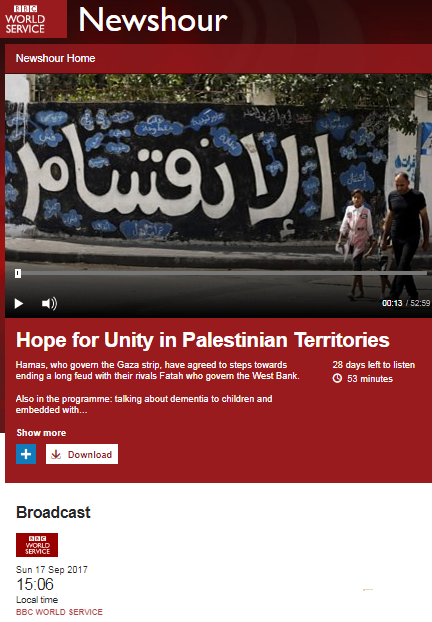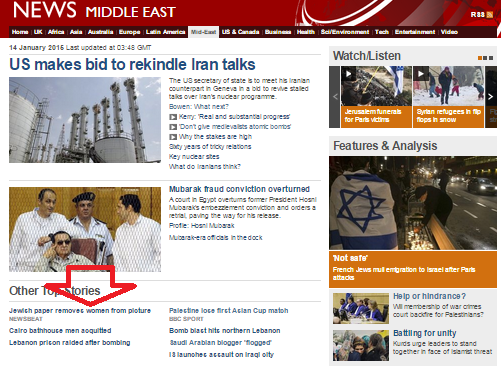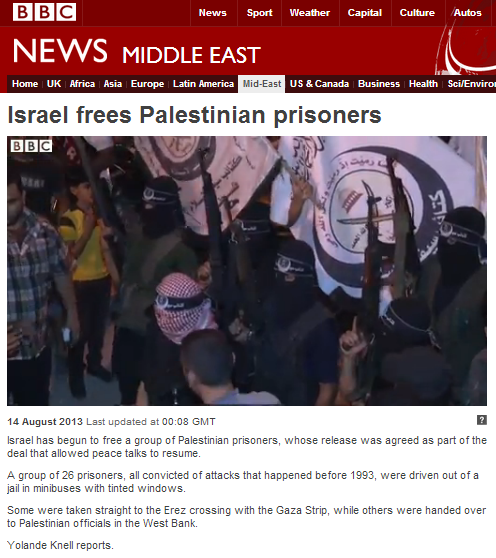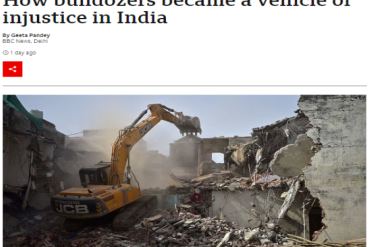On April 30th the BBC News website published a remarkably superficial report titled “White House to designate Muslim Brotherhood terrorist organisation”.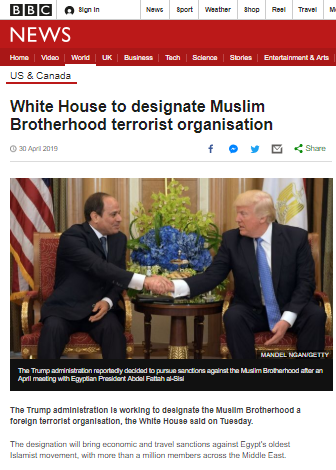
Despite that headline’s clear suggestion that the issue is already cut and dried, that not the case. The report opens by telling readers that:
“The Trump administration is working to designate the Muslim Brotherhood a foreign terrorist organisation, the White House said on Tuesday.”
Readers are also told why that is purportedly the case.
“The decision follows a White House visit by Egyptian President Abdel Fattah al-Sisi in April.
Mr Sisi asked US President Donald Trump to make the move, US media said.”
Two paragraphs later, that messaging is reinforced.
“The Trump administration first directed security and diplomatic officials to find a way to impose sanctions on the Brotherhood after a meeting between Mr Trump and Mr Sisi on 9 April, US media report.” [emphasis added]
In fact, as noted by two authors in January 2017 (a week after Donald Trump became president and over two years before Mr Sisi’s April 9th visit):
“The idea of designating the Brotherhood has been kicking around a long time…”
The article states: [emphasis added]
“On Tuesday, White House Press Secretary Sarah Sanders confirmed the administration is pushing for the designation.
“The President has consulted with his national security team and leaders in the region who share his concern, and this designation is working its way through the internal process,” Ms Sanders said in a statement.”
However, BBC audiences were told nothing of what that “internal process” entails or how long it might take.
They were nevertheless informed of opposition to a process which has yet to be completed, beginning – unsurprisingly – with the Muslim Brotherhood itself.
“In a statement on its website, the Muslim Brotherhood said it would remain committed to its work, regardless of the White House’s decision, Reuters reports.” […]
Readers then heard of domestic opposition:
“The decision has caused a rift between White House officials and Pentagon staff, according to the New York Times.
Though US National Security Adviser John Bolton and Secretary of State Mike Pompeo both purportedly support the move, career national security staff, government lawyers and diplomatic officials have raised legal and policy objections.”
Next came foreign opposition:
“A spokesman for Turkey’s ruling AK Party said on Tuesday that the designation would hinder democratisation efforts in the Middle East and provide a boost to other militant groups in the region, according to US media.”
The BBC did not bother to inform readers of the obviously relevant fact that the AKP is, as the FDD’s Jonathan Schanzer testified before a congressional committee in July 2018, strongly supportive of the Muslim Brotherhood.
“Turkey’s Islamist Justice and Development Party (AKP) is effectively the Turkish arm of the Muslim Brotherhood. Turkish President and AKP founder Recep Tayyip Erdogan publicly supports the movement. That support was most evident during the height of the Arab Spring, when Erdogan apparently believed he could harness the growing political power of the movement under his leadership.
Erdogan dispatched Turkish campaign strategist Erol Olcok to Egypt to help with Morsi’s campaign. Olcok helped Erdogan’s AKP party win eleven elections in Turkey. On September 30, 2012, after Morsi’s victory was secured, Erdogan invited the Egyptian president, along with the Brotherhood-linked Palestinian Hamas leader Khaled Meshaal to the AKP convention in Ankara. After Morsi delivered a speech at the convention praising Erdogan and the AKP, he announced a $1 billion loan from Turkey to Egypt. In February 2013, Turkey’s then-President Abdullah Gul became the first foreign leader to visit Egypt under Morsi’s government. In 2015, Erdogan further admitted that he provided $2 billion to Morsi at a time when no one else was helping Egypt. Turkey’s support became increasingly strident after the collapse of Brotherhood rule in Egypt. The AKP organized public demonstrations in Turkey in support of Morsi following the coup, and at least 1,500 members of the Egyptian Muslim Brotherhood found refuge in Turkey.”
The BBC’s report goes on to promote and link to a video put out by the Brookings Institution.
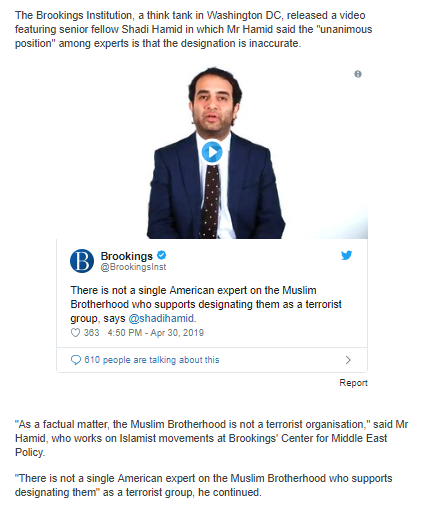
The BBC however refrained from informing its audiences of the relevant fact that the Brookings Institution has for years been funded by Qatar and has a branch there. Qatar is of course the country which has long provided the Muslim Brotherhood with both refuge and cash, as also noted by Jonathan Schanzer.
“Qatar is undeniably the world’s most welcoming and generous jurisdiction for the Muslim Brotherhood. The relationship began in the early 1950s when the tiny emirate “provided a lucrative, stable and welcoming platform where Brotherhood members could safely base themselves, recruit fellow members and prosper.” In the 1960s, the Brotherhood began to use Qatar as a “launching pad” for expansions into other jurisdictions, like the United Arab Emirates. Qatar tacitly approved those activities, so long as the Brotherhood continued to be “outward-facing” and did not pose a threat to Doha. […]
As of July 2013, when the Morsi regime collapsed, Qatar had pumped $8 billion in financial aid to Egypt, according to the Financial Times. Qatar today serves as a safe haven for many Egyptian Brotherhood figures. It hosts the Brotherhood’s de facto spiritual guide, Yusuf al Qaradawi, along with other figures like Asim Abd-al-Majid, Wagdy Ghoneim, Ehab Shiha, Ashraf Badr al-Din, and Hamzah Zawbaa. The fact that Doha hosts these figures became one of the main complaints against Qatar from its Gulf neighbors.”
The BBC’s report closes with a typically sanitised cameo of the Egyptian Muslim Brotherhood.
“The Muslim Brotherhood, founded in 1928 by Hassan al-Banna, has influenced Islamist movements around the world with its model of political activism combined with Islamic charity work.
The movement was initially intended to spread Islamic morals and good works, but soon became involved in politics, particularly the fight to rid Egypt of British colonial control and cleanse it of all Western influence.
In the first parliamentary elections after President Hosni Mubarak’s overthrow in February 2011, the political party associated with the Muslim Brotherhood ascended to power, winning nearly half the seats in Egypt’s parliament.
Since Mr Morsi’s ousting, thousands of Brotherhood members have been arrested.”
Notably, BBC audiences were told nothing at all about the Muslim Brotherhood’s numerous offshoots outside Egypt – including some already designated by the US such as Hamas.
Whether or not the US administration will eventually designate all or parts of the Muslim Brotherhood remains to be seen but as we see, despite its public purpose obligation “to help people understand…the world around them” the BBC has managed to condense a complex issue into yet another trite item in its ‘Trump behaving badly’ genre.

